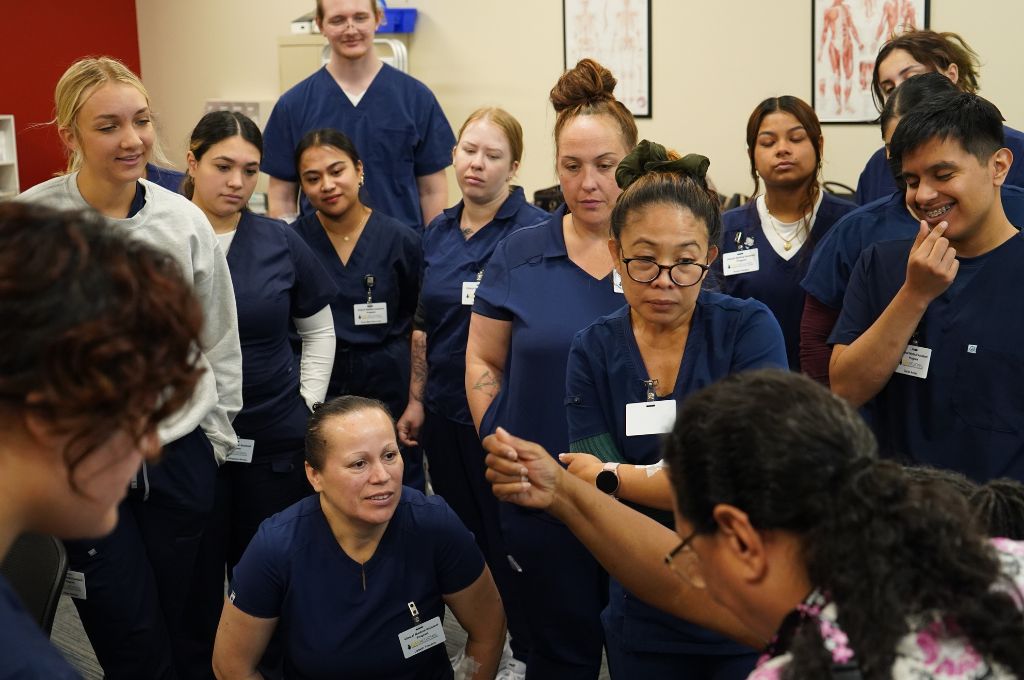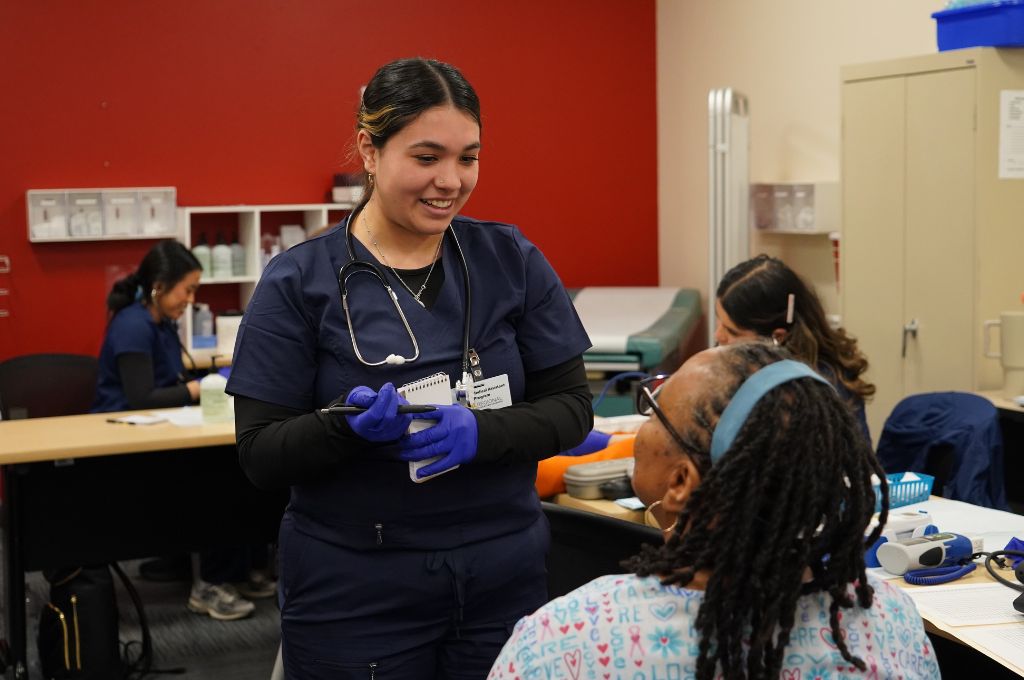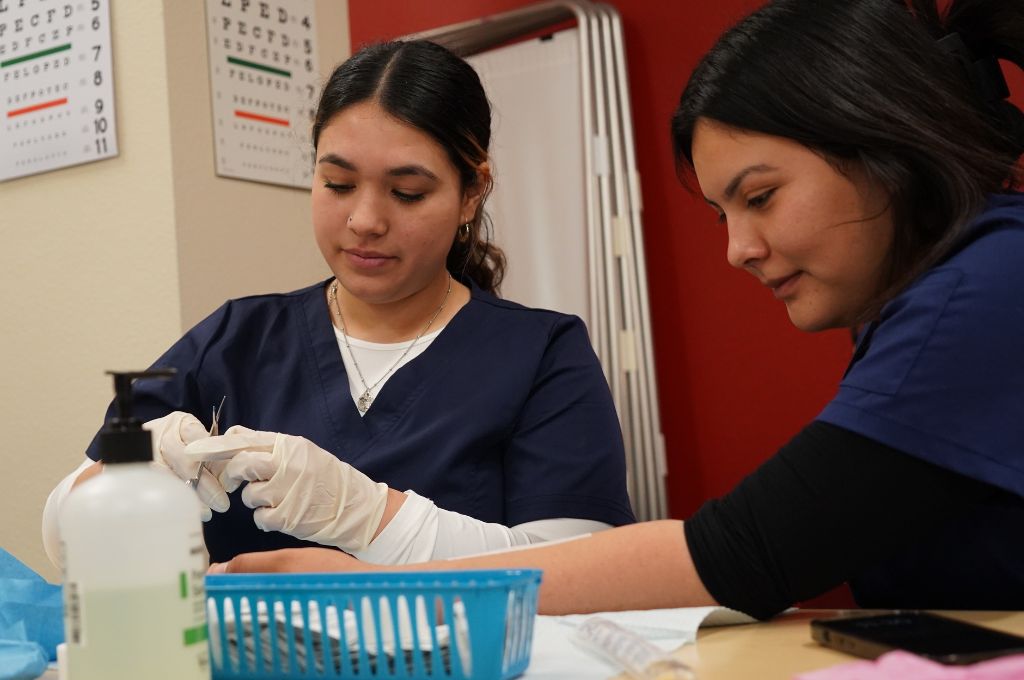Table of Contents
The healthcare industry is an ever-evolving field that offers numerous rewarding career opportunities. One such role is that of a Certified Medical Assistant (CMA). CMAs are vital to healthcare, ensuring the smooth operation of medical facilities. You can think of them as the right arm of doctors and nurses.
If you’re an aspiring healthcare professional or considering a career change, this blog post will guide you through the medical assistant career path. We’ll explore the role, duties, and necessary steps to enter this exciting profession while providing valuable insights and practical tips for getting started.
Understanding the Role of a Certified Medical Assistant
What is a Certified Medical Assistant?
A Certified Medical Assistant is a healthcare professional who plays a critical role in both patient care and administrative tasks within medical settings. CMAs are trained to perform a blend of clinical and administrative duties, making them versatile assets to any healthcare team.
This multifaceted role requires a well-rounded skill set and a compassionate approach as they are often the first point of contact for patients. CMAs work under the supervision of licensed healthcare professionals, ensuring that both medical procedures and office operations run smoothly.
Certified Medical Assistants are in high demand. Case in point, the Bureau of Labor Statistics says that the employment of medical assistants is projected to grow much faster than the average for all occupations over the next 10 years.
A Quick Note on CMA vs RMA Certifications
A Certified Medical Assistant and a Registered Medical Assistant (RMA) are essentially the same thing. Both are well-respected by employers and help advance your career in the medical field. The main difference is the eligibility requirements behind them:
- CMA: Only available to graduates of medical assistant programs
- RMA: Available to graduates of medical assistant programs, OR those with military medic training, OR those with on-the-job training
Where Does a Certified Medical Assistant Work?
One of the many appealing aspects of becoming a Certified Medical Assistant is the versatility the career offers. Their adaptability allows them to work in diverse environments, from bustling urban hospitals to quiet rural clinics.
They can be found in a variety of healthcare settings, including hospitals, clinics, private practices, urgent care centers, and outpatient facilities. Many CALRegional CMA graduates work for notable medical facilities such as Kaiser, Sutter Health, and John Muir.
In each of these diverse environments, the specific Certified Medical Assistant duties may vary, but their primary goal remains the same—offering the best possible care and assistance to both medical staff and patients. This flexibility in work settings makes a career as a CMA both exciting and rewarding.
You can learn more about six places CMAs can work in our blog.
How Much Does a Certified Medical Assistant Make?
Compensation for a Certified Medical Assistant varies based on factors such as location, experience, and the type of healthcare facility. According to the BLS, the median annual Certified Medical Assistant salary is $42,000 per year and the higher end is more than $56,000 per year.
In addition to the base salary, many CMAs also receive benefits such as health insurance, retirement plans, and paid time off. Some healthcare facilities may offer additional incentives, such as tuition reimbursement for further education. Overall, a career as a CMA provides not only financial stability but also opportunities for growth and advancement.
Want To Learn More?
What Do Medical Assistants Do?
A High-Level View of Medical Assistant Duties & the Two Types
The responsibilities of a Certified Medical Assistant are broadly categorized into two main areas—clinical and administrative. This dual role allows CMAs to contribute to both patient care and the efficient functioning of medical facilities. Understanding the distinction between these two types is crucial for anyone considering a career as a CMA.
Clinical CMAs focus on direct patient care, assisting doctors and nurses with medical procedures and examinations, and administrative duties. Administrative CMAs, on the other hand, handle only the clerical aspects of healthcare, such as scheduling appointments and maintaining patient records. Both roles are essential to the overall success of a medical practice.
Note: CALRegional currently only offers the Clinical Medical Assistant Certification (CMAC), though students still receive training in administrative tasks such as recording patient visits, charting a patient’s history, and scheduling appointments.
The Role of a Clinical Medical Assistant
A Clinical Medical Assistant can perform BOTH clinical and administrative duties under the direction of a physician. Clinical duties may include taking vital signs, drawing blood, recording patient medical histories, administering medications, and preparing examination rooms. Administrative duties may include scheduling appointments, maintaining medical records, billing, and coding information for insurance purposes.
In addition to these tasks, clinical CMAs play a crucial role in the education of their patients. They provide instructions on medication usage, wound care, and other healthcare procedures, ensuring that patients have a clear understanding of their treatment plans. This aspect of the role requires excellent communication skills and a compassionate demeanor.
The Role of a Medical Administrative Assistant
A Medical Administrative Assistant does not perform clinical duties. Instead, they focus on the operational aspects of healthcare using specific knowledge of medical terminology and procedures. Duties may include scheduling appointments, managing medical records, billing patients, handling insurance claims, and more.
Administrative CMAs also play a key role in maintaining HIPAA compliance to ensure patient confidentiality and data security. In this role, strong organizational skills and attention to detail are a must to ensure that the office runs smoothly.

How to Become a Medical Assistant
Prerequisites for Becoming a Certified Medical Assistant
Before embarking on the path to becoming a Certified Medical Assistant, there are certain prerequisites to consider. Most medical assistant training programs, like CALRegional’s, require students to possess a high school diploma, GED, or equivalent, be at least 18 years of age, and have no felony convictions or certain misdemeanors.
Some programs may require the completion of specific coursework or prior healthcare experience. However, at CALRegional, no previous experience is required to enter the CMA program. You can learn more about our eligibility requirements on our FAQ page.
It’s important to research the requirements of different programs to ensure that you meet the eligibility criteria. Once you have the necessary prerequisites, you can begin exploring CMA programs that align with your career goals.
Curious as to what important factors to look for in a CMA program? Read our blog about six things to consider when deciding on a program.
Gaining Your Certification or Degree
To become a Certified Medical Assistant, individuals must complete a formal education program, which can be a certificate, diploma, or associate degree program. These programs are offered by colleges, vocational schools, and online institutions. The duration of these programs varies widely; CALRegional’s program is complete in as little as 8 weeks while other programs may take as long as 2 years.
Upon completing the program, aspiring CMAs must pass a certification exam to earn the CMA credential. CALRegional students take the Clinical Medical Assistant Certification (CMAC) exam through the American Medical Certification Association (AMCA). Earning this certification demonstrates your competence and commitment to the profession and is often an employment requirement.
After completing the class portion of CALRegional’s CMA program, students enter a guaranteed clinical externship. While a clinical externship is not required to obtain certification, the real-world experience gained through the externship helps our students get their foot in the door faster because they are job-ready.

Essential Skills Required for Medical Assistants
A successful Certified Medical Assistant possesses a diverse set of skills that enable them to excel in their roles. Strong communication skills are a must, as CMAs interact with patients, healthcare providers, and administrative staff daily. Empathy and patience are also crucial qualities, as CMAs often work with patients who may be anxious or in pain.
In addition to interpersonal skills, CMAs should have a solid understanding of medical terminology, anatomy, and pharmacology. Proficiency in computer applications and electronic health records is also important, as administrative tasks often involve digital record-keeping. Attention to detail and organization will help CMAs manage their responsibilities effectively.
If you haven’t already, consider taking our free quiz to see where your personal preferences and personality may best serve you in the healthcare field. CALRegional has several healthcare training programs available. From working hands-on with patients to staying behind the scenes, the right program is waiting for you.
Conclusion
Pursuing a career as a Certified Medical Assistant offers a unique and fulfilling opportunity to contribute to the healthcare industry. Whether you are an aspiring healthcare professional or looking for a career change, understanding the role, duties, and steps to become a CMA is essential for taking the next step.
By gaining your certification, honing the essential skills, and exploring various healthcare settings, you can build a rewarding career that makes a positive impact on yourself, the patients you serve, and your entire community.
The job outlook for medical assistants is bright and booming, so if you’re ready to take the next step, consider scheduling a quick consultation with one of our Admission Specialists below! They will be able to answer any questions you may have on CALRegional’s programs, including requirements, curriculum, payment plans, and more.
Attend an Info Session

